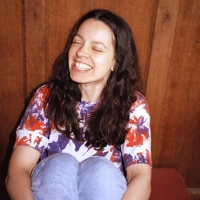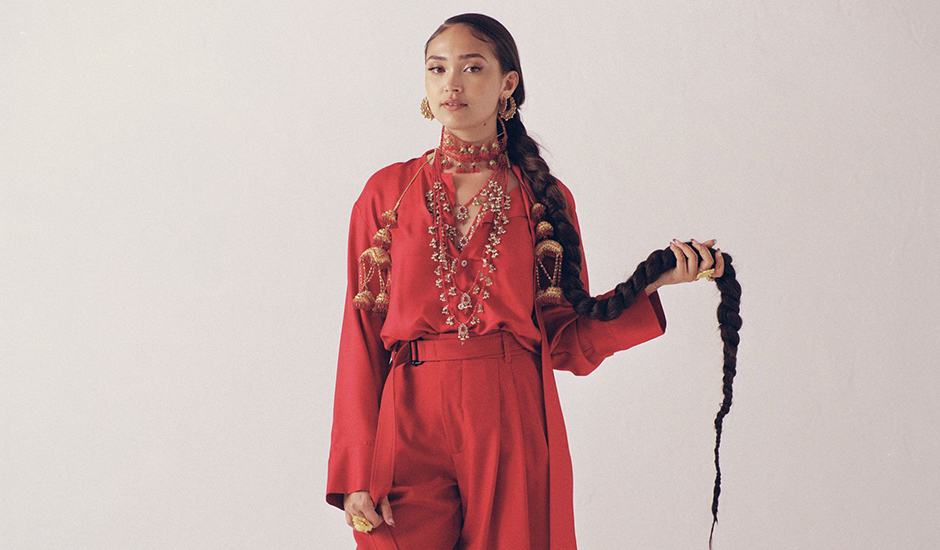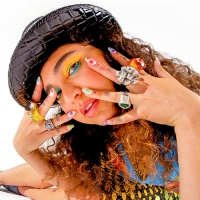 The uneasy beauty of Tirzah: “I didn't have any expectations.”On her sophomore album Colourgrade, London’s Tirzah builds on her intricately spacious sound, diving into the passions of her new familial life.
The uneasy beauty of Tirzah: “I didn't have any expectations.”On her sophomore album Colourgrade, London’s Tirzah builds on her intricately spacious sound, diving into the passions of her new familial life.

Joy Crookes isn’t going to play it safe: “I’m going to be bold.”
On her debut album Skin, the South London musician creates a captivatingly powerful listen on personal and artistic identity.
In the video clip for Feet Don’t Fail Me Now, Joy Crookes does a wheelie on a motorbike, wearing a white sari - a garment typically worn by widows in South Asian culture - while surrounded by pointing and laughing Bangladeshi men standing behind her.
It’s a striking shot; A moment of empowering cinema that captures the same bold beauty as Beyoncé’s Lemonade or Solange’s A Seat At The Table visuals, albeit with a 23-year-old British-Irish-Bangladeshi musician in the centre image. More than that, however, the video provides an example of how Joy Crookes strives to challenge ideals through her work, reclaiming systemic ideas on power, culture and identity through the art that she creates. “I'm owning my narrative,” she told i-D Magazine with the video’s arrival. “No one can tell me anything.”
While Feet Don’t Fail Me Now’s empowering video certainly stands tall, it merely scratches the surface of Joy Crookes’ artistry and the greater meaning that blooms amongst its beauty. It began with her debut EP Influence in 2018, a stark introduction to the then-18-year-old as she fused genre-crossing musicianship with detailed lyricism on cultural identity, feminism and self-confidence. 2019’s Reminiscence EP followed suit, emphasising her connection to her ancestry and the heritage and culture she absorbed on her first visit to Bangladesh - her mother’s birthplace - the year prior. Then came the trilogy-closing Perception EP later that same year, bringing with it messages on multi-culturalism and personal, intimate weakness.
Now, on her 13-track debut album Skin, the Joy Crookes journey encounters its defining moment. It’s an album eight years in the making, capturing the South London musician’s journey through adulthood as she greater establishes her identity in her past, present and future, all while gazing out at the constantly-changing socio-political world surrounding her. It’s full of the intricacies and detail that have pedestaled Joy Crookes as a blossoming artistic force, full of the personal intimacy that sits within her lyrics, her production, and the visuals that tie them together. In all, Skin is an album that showcases every single facet to Joy Crookes: “This is an album about my identity,” she confirms.
Joy Crookes’ identity is something that seeps into every level of Skin’s being. Lyrically, the album is celebratory and grand yet intimate and bittersweet, drawing parallels within the contrast in oneself. Sonically, it builds from the multi-culturalism of Crookes’ own life (she was born in London to a Bangladeshi-Bengali mother and an Irish father); Crookes - as the album’s executive producer - leading you through a journey that stretches from stripped-back R&B to percussion-filled bursts of cultural excitement. Visually, the themes of identity and self are constantly reinforced and built upon, with videos rich with symbolism placed alongside artwork and imagery by Carlota Guerrero, known for her trailblazing work with Solange (A Seat At The Table), Arca (KiCK i) and more.
On Skin, these many edges of Joy Crookes’ work - the lyrical, sonic and visual sides - all intertwine with one another to uplift this core theme of identity; the album’s title being reflective of its greater messaging, how one thing - your identity; your skin - can simultaneously be the most powerful part of yourself, but the part most held against you. It’s something Joy Crookes processes across the course of Skin, from its inwards-facing moments of reflection and solemnness right through to its more extensive dissections of social media activism and the UK’s conservative government. “This juxtaposition is grappled with throughout the album; lyrically, my album is effectively a collection of stories,” she says.
They’re stories that have continued to deepen even well after the album’s eventual completion. “I’ve never spoken so much about myself in my life as I have now,” she says, speaking over Zoom as she does press the morning before Skin’s arrival. As we talk, it becomes clear that Skin isn’t so much a project-defining album for Crookes as it is an album that defines her life; an album full of learnings that summarise her continued personal and musical growth throughout the last eight years. You’d be hard-pressed to find such a potently intimate debut album released this year. “It’s just… me,” she elaborates.


Skin arrives tomorrow. How are you feeling about it?
I feel excited, overwhelmed, scared, and basically every other emotion all in one.
I bet. I know a debut album can often be quite difficult, as there are many unknowns within the process. How did you find it?
Writing is hard and so difficult; writing something that you like is so hard. Like, for every song I write that I like, I probably write 12 songs I hate - and that’s just the truth. It’s a long, drawn-out process and when you have those moments - those times where you’re flowing creatively - it might be my favourite feeling in the world. I mean, it just feels like I can breathe - but it’s not easy to get to that point.
Was there anything that maybe surprised you about the album writing process? Was there anything unexpected?
Just the fact that I did it, that I survived it. It probably sounds great, but I think the fear - the genuine fear - of writer’s block was so real for me, and the fact that I even managed to write the album is amazing. A lot of people are like, “what do you mean you think this and think that?” But it’s also how I’ve felt towards music; I’ve always struggled with being consistent in my writing because I get so upset that it’s not coming out the way that I want it to.
Of course. Especially if you have the level of detail and control that you have within your work.
Yeah. It’s a long process, but it makes it all so much more worth it.
I know that this album revolves around themes of identity and self. Was this something conceived before you started working on the album, or was it something that came quite naturally as you writing it?
Naturally. I’m not really a conceptual artist, like I don’t really come up with things on a vision board or anything - if it comes together it comes together, and if it doesn’t, then you work harder on it. We knew what the songs were, but we’d just come into writing like “let’s just record some stuff that feels kind-of menial and every day to see if there’s a way we can weave that into the record.”
Did you find it quite an intense process, writing so intricately about yourself and your identity?
Yeah, sometimes it got really intense. There are some subjects that are really hard for me to talk about even out loud, let alone writing a song about it. I guess that’s why I collaborate with a lot of people. It feels like if I do it myself, I get stuck into my own head. That’s where it gets intense, though: sharing - the amount I share with my collaborators is intense.
Do you have a different mindset when you’re thinking about sharing it with the general population, then?
Music is amazing because I know that it can be interpreted in different ways. For me, it’s more so like the intensity of the room while writing the song - that’s where it’s most difficult. I guess it’s really hard to think about a lot of people you can’t see, you know what I mean?
Especially when you aren’t doing shows. You can’t visualise the people that listen to your music.
Exactly, which makes it so easy to just forget about them. It’s interesting, a lot of people say that I write for the people and stuff like that, but I don’t, I write for myself and write for the sake of writing. The fact that there are fans and people that resonate with it is just like a bonus for me.
Some of the songs on Skin are incredibly complex, either because they’re about yourself in intricate detail or because they talk about quite broad, general things. What was the process of compiling all of these thoughts and experiences into these short, three-to-four-minute songs?
It’s great sometimes, but also so annoying. The limitation is amazing, but at the same time, when you’re trying to write about the Tory government, you’ve got three-and-a-half minutes to write about so much. Like, writing about cancel culture and activism, I always think, “oh my god, I don’t really think I have the time to get out all of my thoughts about this.” But actually, the limitation is always what makes the song happen; if the song is good enough, the limitation is the thing that drives me to finish it.
What is it about that limitation that drives you to actually finish these songs?
I think it’s just knowing that there’s an end and that there has to be an end, so you can’t keep going - it can’t be a seven-minute song. I mean, I’m not against doing seven-minute songs, but if I want to write a pop record, they’re not going to be seven-minute songs. You’ve just got to get it done and be concise, and my favourite music that does that it is punk - like boom, two minutes, and you’ve said what you need to say.
Your identity is obviously very ingrained into the album’s lyricism, but I know that you’re the executive producer of the album too. What did you set out to do with the album production-wise?
The opposite of the lyrics, almost. No limitations. I didn’t want to play it safe. All artists tend to play it pretty safe on their first record, but I don’t really think that I’m a safe person. Like, if I am going to make a record - regardless if this is my first out of many or the only record I make - I just can’t not be bold. If it’s safe, then what’s the fucking point? I think there’s a natural inclination to make the first record safe because it’s your first time out in the world, but sonically speaking, no way. I couldn’t do that. I can’t fucking play it safe. Say I die after this record and I played it fucking safe? What the fuck?
There’s a lot of different genres and sounds spread throughout the album’s production. Where does that come from?
It’s just what I’m interested in, really. There’s brass inspired by Nigerian artists on the album; there’s D’Angelo inspiration and Massive Attack inspiration. I think it just shows my musical education and how much I love music full stop.
And then there’s the visual side of the album, which I know you are very ingrained in as well. What did you want to convey with that side of the album?
Skin. How do I take Skin - the music and how long I’ve spent on the music - and make it into visual art? I wanted to be a photographer before I became a musician, so I had to put that hat on. How do I best serve music through visuals? I think music is very visual, so it’s like tapping into those words and seeing if there’s a theme, and then how do I make turn that into photos and videos? Oh, and then you say you want one of the best photographers in the world to work on it.
I mean, you said you didn’t want to play it safe.
The process certainly wasn’t safe, I can tell you that.

Was it an easy process conveying the album visually?
Everything takes time and planning. It was easy when we were in the mood, and I mean… Carlota Guerrero is one of the best photographers in the world. Her understanding of women and women’s bodies and skin is unbelievable, and it’s an absolute pleasure to work with someone like that.
The work she’s done with Solange is incredible, and I know you’re very inspired by that. Was there anything that you were really able to take away from working with Carlota?
How to feel strong in being vulnerable and feminine. I think I struggle sometimes feeling strong when presenting very feminine, and she made me realise that there’s so much strength in that.
This album represents such a long portion of your life, and the life that surrounds you. What did you learn about yourself while creating this album?
I’ve learnt that I am so much stronger than I realised, so much stronger. I’ve learnt that I work hard. I’ve learnt that I can be a complete child sometimes, but I’ve learnt that I can be strong enough to say no and be right in the long run. I’ve learnt that if I don’t ask, I don’t get.
I think most of all though, I’ve learnt that I’m just a survivor. There are so many reasons why this album shouldn’t have come out; there are so many reasons why this couldn’t have come out. One of the biggest obstacles is the way my brain works, and I’ve survived all of that and I’ve made this record - and I never necessarily thought this day would come. So ultimately, the most important thing is that I am proud of myself and my work ethic - that’s probably what I learnt the most.
Joy Crookes' debut album Skin is out now via Insanity Records / Sony Music Australia.
 The uneasy beauty of Tirzah: “I didn't have any expectations.”On her sophomore album Colourgrade, London’s Tirzah builds on her intricately spacious sound, diving into the passions of her new familial life.
The uneasy beauty of Tirzah: “I didn't have any expectations.”On her sophomore album Colourgrade, London’s Tirzah builds on her intricately spacious sound, diving into the passions of her new familial life.
 Year of the Wolf: Inside Remi Wolf’s wild, yet withdrawn worldThe Californian musician’s debut album Juno is one of 2021’s most electrifying - and most intimate - pop albums.
Year of the Wolf: Inside Remi Wolf’s wild, yet withdrawn worldThe Californian musician’s debut album Juno is one of 2021’s most electrifying - and most intimate - pop albums.